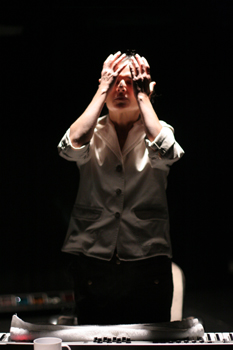
- Time Out New York February 9, 2006
- Flavorpill NYC February 7-13, 2006
On The TV: Re-enacting Kerouac Interviews
by Jason Zinoman
“The only people for me are the mad ones,” Jack Kerouac writes in On the Road, “the ones who are mad to live, mad to talk, mad to be saved, desirous of everything at the same time, the ones who never yawn or say a commonplace thing.”
He would have loved the Elevator Repair Service, the inspired avant-garde company whose new work, No Great Society, is primarily composed of the transcribed text from two television interviews with Kerouac. Only a slightly cracked company would read the entirety of The Great Gatsby in a five-hour show, Gatz. Or mount The Bacchae with puppets.
Under the careful guidance of John Collins, the director, their new show is a joy from start to finish, featuring excellent performances and the loose-limbed spirit of work born out of improvisation. The first half is a madcap re-enactment of a 1968 episode of William F. Buckley’s Firing Line,” which showcases four otherwordly eccentrics (Mr. Buckley, Kerouac, Ed Sanders from the band the Fugs and an academic, Lewis Yablonsky) so different from one another that they don’t seem to belong to the same species.
In his spot-on imitation of Mr. Buckley, Ben Williams captures every drawn-out vowel and self-satisfied smirk, while acting as the ringmaster of this circus. Sanders (Scott Shepherd), wearing yellow socks on his feet that match the floppy curls on his head, uses “freak” as a verb, and suggets that the Vietnam War is a conspiracy to attract more jeeps into Vietnam. Vin Knight’s nasal-sounding professor has spent years studying youth culture, but can’t seem to pronounce “commune.”
Still, Kerouac (Susie Sokol), who in real life died of alcoholism a year after the Buckley broadcast, steals the show, drunkenly interrupting everyone and, despite Mr. Buckley’s efforts, refusing to play the part of the grandfather of the Beats. “I believe in order, tenderness, and piety,” the eye-rolling Ms. Sokol says in a working-class accent.
Part 2 is loosely based on an appearance that Kerouac made on Steve Allen’s variety show in 1959. After taking off his gray wig in front of the audience, Mr. Williams transforms into Mr. Allen, all smiles and show-biz charm. Kerouac looks uncomfortable, but this interview quickly departs from any realism and turns into something much moodier and almost dreamlike (Mr. Collins added the stark, affecting lighting). Ms. Sokol, a youthful-looking downtown fixture with pencil-thin legs and deadpan delivery, performs silly dances, riffs on passages from Kerouac and even speaks as herself. “Susie told me she was nervous before the show,” Mr. Williams says. “Are you nervous now?” She says no.
Is this an homage to Kerouac’s stream-of-consciousness style? Or a collection of small reminders that these actors are playing characters? Whatever the purpose, the Elevator Repair Service makes sure that there is nothing commonplace about its delightful show. Yawning is out of the question.